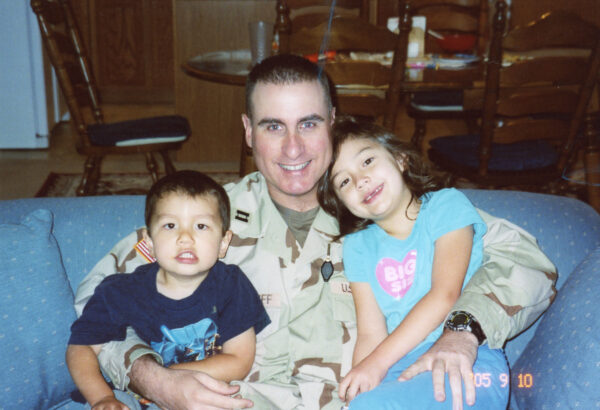
Cassidy La Bouff with her father, U.S. Army Maj. Douglas A. La Bouff and brother.
As part of observing Memorial Day this year, we are teaming up with our long-time collaborators at the award winning non-profit outlet the War Horse. They were kind enough to share a personal essay from Cassidy La Bouff, who participated in their writing seminar for Post-9/11 Gold Star Children and Siblings.
As always we try to center perspectives and narratives from communities you’re less likely to hear from as part of our Listening Post Collective work, including the voices of families impacted by military service. Cassidy La Bouff’ shared her essay about the impact her father’s death while serving in Iraq had on her family back in the US, and what she’s learned in the almost two decades since.
Cassidy was also kind enough to do a Q and A with the Listening Post Collective about how her family observes Memorial Day, the narratives she feels like are missing about military families, and more.
LPC: What happens on Memorial Day around your family? How do you observe it?
My family recognizes and remembers the sacrifices made by those who served in the military by visiting the Mountain Post Warrior Memorial in Kit Carson Park in Colorado Springs. We like to place my dad’s favorite flowers, red roses, by his name at the memorial. We then take a few private moments to talk about all the great moments that have happened within the year that we wish he was there for. Although, we know he is always watching over us, it is nice to feel like we are talking to him, especially on days like this where his presence is missed a little extra. I am also very fortunate to have a close Gold Star Community, so the day is also spent with numerous facetime calls to other Gold Star friends.
LPC: What narratives do you feel like are missing around military families when it comes to the wider public?
A few narratives that I feel are missing from military families when it comes to the wider public is the weight that we carry. There are so many different perspectives that are still yet to be told that can focus on financial strains due to constant moving, coping with the stress of deployments, transition challenges, the impact of trauma and war, and the voices of veteran caregivers to name a few.
LPC: When we think of information ecosystems, we think of how different communities get and share key news and information that impacts their lives. An ecosystem can be shaped by language, race, geography, and so many different things. I’m curious in the military community what that ecosystem looks like.
Although the military community is large in number, it also can also feel very “tight” as the bond of military service connects us all. In recent years, I feel that the voices of our military and their families have been amplified to the public through the news, personal blogs, books, social media, and short films and documentaries. One theme will also stay strong and true, our remarkable resilience and strength. There are also so many great nonprofit organizations focusing on various groups within the military community that allows members to connect and share their stories. I have had the honor of connecting with various Gold Star focused nonprofits that introduced me to other Gold Star children, sisters, brother, and spouses that have formed into deep friendships. These communities help us grow in our personal journeys but also give us a space to express our individual voices. Loss is universal. But our grief is unique.
LPC: In your essay you talk about the different reactions in your house to your dad’s death while serving in Iraq. Your mom going back to college and doing homework late at night stuck with me. I feel like those narratives, the ones that take place over time after a tragic event, are often missed. What important story do you think those evolving narratives tell over time?
The day my dad passed has played in my mind hundreds of times. Each time, a new perspective can be seen. As I grow, heal, and evolve, the narratives also evolve. As I grow older, I have thought of my mom’s perspective more often then mine. To grieve the loss of your partner while also keeping our family afloat is not an easy task. She is truly my superhero. Like many Gold Star families, our remarkable resilience, strength, and compassion can be seen in everything we do. And evolving narratives like these are just a small look into how we continue in honor of our loved ones.
LPC: What is your sense of the “audience” for stories about military service and its impact on families? What “audience” should it have in your opinion? And what kind of impact would you like stories like yours to have?
I believe that military focused stories are meant for everyone. When a military member shares their voices, you are hearing accounts of history, firsthand. In addition, when an extended member shares their story, you are hearing narration from a different perspective. Like all other Gold Star stories shared from the War Horse Gold Star Writing Retreat, these are first-hand accounts on the effects of war on those left behind. I hope my stories, and others shared, can touch readers and allows the legacy of our loved ones to continue. More importantly, I hope my story can help those who are in their grief process, feel less alone. Your loved one is with you in your heart, always.
